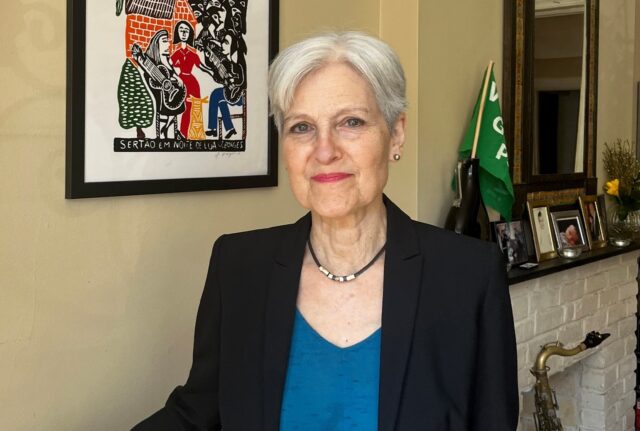Climate change is a major issue on the US political agenda, yet the country’s Green Party and its candidate Jill Stein are next to invisible in the presidential race.
Making her third tilt at the White House, Stein is relying on her positions on issues outside of the environment to stay in the mix.
According to a recent poll, she is pulling around three percent support, after finishing with 0.4 percent and one percent of votes in 2012 and 2016, respectively.
“Our first priority is to get on the ballot,” a step requiring thousands of signatures, explains the 73-year-old doctor. “So we’re very focused on that now, rather than a national media strategy.”
In a Philadelphia park on a recent Saturday afternoon, party activist Alex Casper was pitching passers-by on an alternative to Democratic incumbent Joe Biden and Republican Donald Trump, both disliked by wide swaths of US voters.
“I’ll say, ‘We’re out here trying to support anti-war efforts, do you mind helping us get more candidates on the ballot that’ll support that?’ And people very oftentimes are receptive to that,” Casper says, adding that people are also quicker to engage on the country’s housing crisis and mass incarceration.
“Environmental ideas sometimes don’t always resonate as much because a lot of folks, they assume that the Democratic Party is standing on their side,” Casper says.
Stein charges that Biden only offers “false solutions” on the environment.
“If you want to stop the meltdown of the climate, you have to eliminate fossil fuels. And they have not done that — they have massively expanded fossil fuels,” she says of Biden and his Democratic predecessor Barack Obama.
The United States is today the world’s leading producer of oil and gas.
‘Anti-genocide’
Initially, Stein supported academic Cornel West, who left the party in October to campaign as an independent.
But without a candidate, the Green Party risked losing automatic access to the presidential ballot in certain states — so the Chicago-area native stepped up again.
“Did I want to see the last two decades of my life go to waste? No, I did not,” she says.
“We are the only anti-genocide, anti-war, climate emergency, pro-worker campaign that is on track for full ballot access,” says Stein, who is also the only woman still in the running for president.
The Green Party denounces what it calls the “genocide” of Palestinian civilians in Gaza, breaking with Biden and Trump, as well as Robert F. Kennedy Jr., the top-polling independent with around 13 percent support.
The Greens also advocate for disengaging from armed conflicts. This move — coupled with steeper taxes on high incomes and assets — would provide funds for education, green energy, housing and universal health care, Stein says.
‘Intimidation campaign’
Bernard Tamas, an expert on US independent parties at Valdosta State University, says Stein is unlikely to go higher in the polls.
“Third parties in America have very few resources,” he says, noting that they don’t receive public funding.
“It’s extremely expensive to run in the United States. And so they wind up in this position of weakness compared to the major parties,” especially in being unable to afford advertising.
Most voters considering a third-party candidate typically end up backing a major-party candidate at the ballot box, he adds.
Emma Cramer, a visitor to the Philadelphia park, signed the petition to have Stein added to the Pennsylvania presidential ballot but said she doesn’t intend to support the Green Party.
“I don’t think we’re at a point where voting third party makes a difference, unfortunately,” she says.
Stein denounces an “intimidation campaign” by major parties, in particular Democrats, who say a third-party candidate could tip a close election.
“Studies are very clear that people who vote Green are largely people who otherwise won’t vote,” Stein says.
And she rejects assertions that the Green Party doesn’t have any influence on the US political agenda.
The party’s “huge impact” can be seen in moves to enact climate reforms, cancel student debt and expand health coverage — all Green ideas adopted by Democratic administrations, she says.
“This is going to be a very close election,” Tamas says.
“If Biden loses one percent to … Jill Stein and to Cornel West, that could decide the election right there,” he says — making it imperative that the president addresses the issues raised by the third-party candidates.

COMMENTS
Please let us know if you're having issues with commenting.